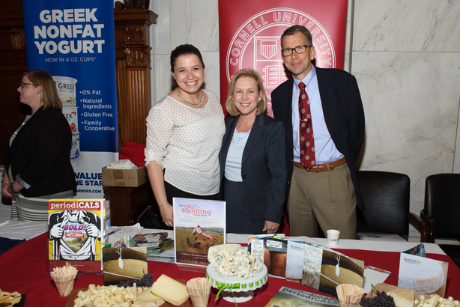D.C. tasty tradition features fare from CALS
By Art Silverman

The Empire State’s agricultural bounty was on mouth-watering display for our nation’s leaders the evening of July 29 when the annual New York Farm Day was celebrated in Washington, D.C.
Many of the featured items had deep connections to Cornell, reflecting the vital role its College of Agriculture and Life Sciences (CALS) plays as a support system for the state’s $5.7 billion agricultural economy.
The ornate Kennedy Caucus Room of the U.S. Senate was transformed into a high-end restaurant, watering hole and farmers market for the evening. Members of Congress and administration officials were on hand to sample oysters, clams and scallops from Peconic Bay, cheeses from the Finger Lakes region, apples from Saratoga and infused berries from Germantown – and to meet the people who produce them.
New York wines, beers and spirits flowed freely, while leading restaurateurs prepared signature dishes from locally sourced ingredients. And everywhere one turned, there seemed to be a Cornell connection.
Consider, for example, the champagne strawberry ice cream from Mercer’s Dairy in Oneida County. Cornell food scientists helped Mercer’s develop a novel manufacturing process that preserves the wine’s alcohol content. Staff from Cornell Cooperative Extension helped pass legislation in Albany granting the product legal status; others are helping the dairy protect its intellectual property.
And that’s how Mercer’s came to make the only ice cream in America for which an ID is required to purchase.
“We’re very grateful to Cornell,” said co-owner Roxanna Hurlburt. “They’re great facilitators on the marketing side, and we’ve also done a lot of experimental work down on campus.”
Across the room at Cornell’s reception table, guests sampled a quartet of artisanal cheeses. As part of a corporate partnership program with Wegmans, food science faculty and extension associates are working with artisan cheese makers in New York and the Northeast to support their growth and help the quality of their product.. The grocery chain has committed to buying a substantial portion of each company’s output for sale in Wegmans stores, allowing the artisans to expand their own operations in turn.
These intimate connections between Cornell and New York agriculture should be no surprise, according to Jan P. Nyrop, senior associate dean of CALS. The same is true for virtually any New York crop or food product, from beef cattle to maple syrup.
“Agricultural research and outreach have been core components of Cornell’s mission ever since its founding in 1865,” he said, “when we were designated as New York’s land grant university.
“That historical trajectory is carrying forward and even accelerating in the modern era,” Nyrop continued. “Cornell’s continuing involvement in agriculture – in New York and globally – is rooted in the fact that meeting the nutritional needs of humanity will continue to be one of the grand challenges facing society.”
Those larger public policy issues will certainly resonate in Washington, where U.S. Sen. Kirsten Gillibrand (D-NY) hosted New York Farm Day (and sits on the powerful Senate Agriculture Committee). U.S. Sen. Charles Schumer (D-NY) also attended, as did many members of New York’s congressional delegation, including U.S. Rep. Chris Gibson, Ph.D. ’98 (R, NY-19).
Art Silverman is a freelance writer in Washington, D.C.
Media Contact
Get Cornell news delivered right to your inbox.
Subscribe